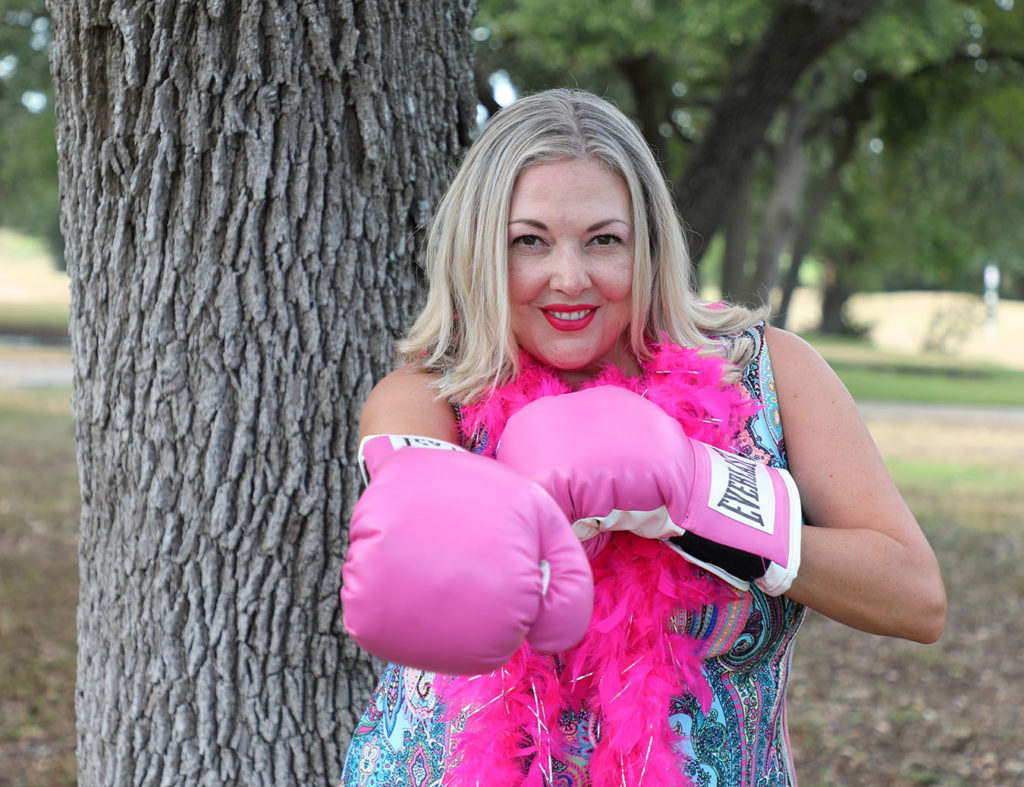A Young Woman Faces Breast Cancer, Then NET
By the time she was 40 years old, Alicia Gutierrez had earned her stripes as a pink zebra with diagnoses of breast cancer and pancreatic neuroendocrine cancer.
While living in the Middle East, Alicia noticed an indentation in her breast. Concerned, she consulted an ob/gyn. Then another ob/gyn. Then another. All three assured her nothing was wrong; she was just 37 years old. She was advised to change the type of bra she wore.

Upon returning to the United States in June of 2016, the indentation in Alicia’s breast had grown from 1 centimeter to four inches in diameter. She saw another ob/gyn, who said it was not cancer. For three years she advocated for mammograms, ultrasounds, and second opinions. In October, a radiologist, with test results in hand, asked Alicia, “Why did you wait so long?”
Alicia underwent a double mastectomy and reconstruction—a total of six surgeries—which caused a range of aches and pains. Regularly, Alicia pointed out to her care team that she had pain in her left side. Her concerns were dismissed, but she persisted. Eventually, her doctor ordered a colonoscopy. The test result was normal. Her doctor treated her for acid reflux.
Then came chemotherapy, during which the persistent side ache subsided. When it returned a few months later, Alicia begged her oncologist, “Please give me a scan.”
“No. It would not metastasize there,” the oncologist replied.
Believing in herself and trusting her body, Alicia looked for a different oncologist.
“You have what many breast cancer survivors have–depression and anxiety,” said the second oncologist.
“These were respected, highly regarded oncologists,” said Alicia. “But, they just didn’t understand NETs.”
Alicia wasn’t asking when she got to her third oncologist. She demanded a scan, “This is my life, and I want a scan.”
Her pancreas lit up in a PET scan. But the follow-up CT scan was negative. “See, I told you it was nothing,” the third oncologist said. “You are all right. It’s time to go out there and live your life.”
Next, Alicia turned to the physician she credits with saving her life, Nicholas Martinez, MD, a gastroenterologist in San Antonio, TX. He assured Alicia it was not in her head and wanted to order a MRI.
“This was the first doctor that ever listened and really heard my symptoms,” said Alicia.
Dr. Martinez ordered an MRI for the next day. Hours later, he called to tell Alicia she had pancreatic cancer. A biopsy would confirm it as neuroendocrine. It was 2018, two years to the month after her breast cancer diagnosis. A distal pancreatectomy and splenectomy removed the tumor with no need for further treatment.
As Alicia learned about neuroendocrine cancer, things started to fall into place. She had experienced diarrhea and flushing for many years, which she attributed to living in a hot desert climate. She began to investigate further.
Alicia met other “zebras” by joining Facebook groups, watching videos, and educating herself. She filled a four-inch binder with test results. “I knew what would happen if I had a Ki-67 score of 2 or 24.” She was determined to educate herself in order to effectively advocate for herself.
Alicia realized that a physician’s knowledge only goes so far. She embraced the value of her knowledge and instinct. She knew her body, her symptoms, better than anyone else. “If you feel something is not right, advocate for yourself,” she said.
Education goes together with self-advocacy. Before and after appointments, Alicia researches what a test is for and what the results mean. She keeps her needs at the center of treatment planning.
Alicia acknowledges that when she walks in with a four-inch, eight-pound binder, specialists may think the worst. “They may look at me and think, ‘hmmm, is this woman crazy or what?’”
As a younger woman, Alicia also acknowledges that there is a power dynamic when she challenges doctors. She has heard the “I’m the doctor here” response many times. But her belief in herself endures. It’s her life, she reminds herself.
“You go in humbly and ask for what you believe you need,” she said. “When you are told no, you assertively say, ‘here is my factual evidence that I’d like you to listen to.’”
As a volunteer with a local breast cancer group, Alicia helps others believe in themselves. She encourages her “breast cancer sisters” to keep asking questions until they find a physician that will listen.
Alicia suspects some of the physicians she has seen considered her a ‘problem child.’ “If I didn’t do what I did, where would I be now?” she asks. “I would be dead, or I would be stage IV, not in the position I am in.”
Unable to take anything for granted, Alicia is thankful and faithful. In her survivorship, she has found a higher purpose. “I want to advocate. I want to speak out. I want to help others.”
